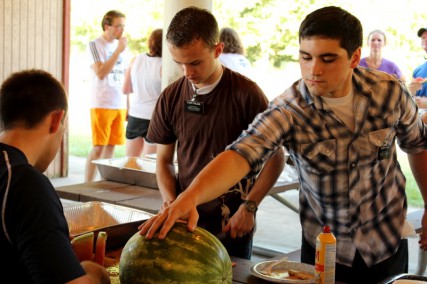
In my last article, I explained why members of The Church of Jesus Christ of Latter-day Saints are called Mormons. Today, I thought I would answer a question my friends and acquaintances sometimes have when I mention a church commitment. They look at me with wonder as if to say, “Why are you always doing something at church?”
Part of the answer lies in the fact that, much like other churches, there are many activities available in addition to the regular Sunday worship. We have youth activities, service projects and occasional holiday celebrations.
However, a large part of the reason why members of the Church of Jesus Christ of Latter-day Saints are so involved in church is that we have a “lay ministry.” This means that there is no paid ministry or clergy, but rather, the members themselves share responsibility for offering the prayers, preaching the sermons and caring for the members in need. Individual members of the congregation fill assignments (which we refer to as “callings”) that allow the congregation, and the Church as a whole, to function and care for its members.
These assignments, or callings, vary greatly, from serving as the bishop (the leader of a local congregation) to teaching a Sunday School class to organizing youth activities. The youth also participate and are given callings relative to their classes and activities. Members often spend about five to ten hours per week serving in their callings. Some responsibilities, such as that of a bishop, require a great deal more time and dedication.
These callings are not permanent positions. Local church leaders pray for inspiration in deciding who might serve in a particular position at a particular time. For example, someone who has served as a bishop for several years may, at a future time, be asked to teach the Sunday School class for the five-year-olds. All callings are considered important because each plays a role in meeting the needs of the members, thus contributing to the wellbeing of the congregation at large. (Scroll down to the bottom of this article to see an infographic about lay leadership.)
Paul’s teaching to the Corinthians seems to be applicable here:
“But now are they many members, yet but one body. And the eye cannot say unto the hand, I have no need of thee: nor again the head to the feet, I have no need of you. Nay, much more those members of the body, which seem to be more feeble, are necessary … that the members should have the same care one for another.” – 1 Corinthians 12:20-22, 25, King James Version.
Such a system of operation helps foster a sense of commitment and belonging among our members. This may help account for data gathered by the Pew Research Center, which shows that nearly seven in ten members of our church show high levels of religious commitment. This was more than any other religious group surveyed.
Additionally, having the opportunity to work alongside and serve other members of the church plays a large role in creating a strong and close-knit bond among our members. Fellow church members often feel more like extended family. I know that no matter where I go, I can feel at home in the church. Other researchers have noted that “no religious group in America feels warmer toward their own group than Mormons.” This sense of close community seems to have particular benefits among our youth, who have been found in recent studies to be more positive, healthy, and self-aware and less likely to engage in high-risk behavior than other teenage groups, according to the book “Almost Christian: What the Faith of Our Teenagers is Telling the American Church.”
In my own life, I have had opportunities to serve in various callings over the past decade. I have taught Sunday School classes, organized youth activities, and, at different times, played for and taught the music portion of the children’s Sunday School.
Several years ago, my schooling took me to Mexico to teach English. One of the first things I did was search out the local congregation. I was welcomed with open arms as if I were a member of the family. They had a piano, but no one knew how to play it. I was immediately asked to serve as their pianist. Not only did I feel welcomed, but I had a responsibility that helped me feel like a contributing part of the community.
Thousands of miles from my family, in an unfamiliar culture, and speaking a different language, I had a place where I belonged. I had a place where I felt at home.
Kirsten Moore Pinto is a Spanish teacher in Columbia, MO and a member of The Church of Jesus Christ of Latter-day Saints.






